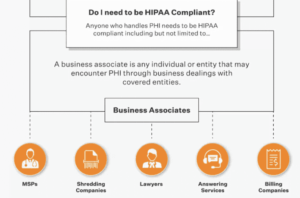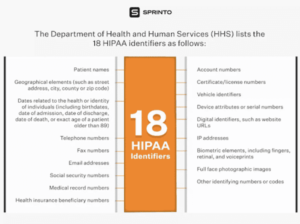Your healthcare business stands to gain a lot if it gets compliant with HIPAA!
What Does HIPAA Mean?
HIPAA is a federal law that came into existence in 1996. Its primary purpose is to protect the privacy and security of individuals’ health information and to ensure the portability of health insurance coverage.
HIPAA sets national standards for protecting the privacy and security of highly sensitive health data, also known as protected health information (PHI). It requires healthcare providers, medical plans, and clearing houses, to ensure the confidentiality and security of PHI during its use.
HIPAA also provides individuals with certain rights concerning their health information. These rights include the right to access their PHI, the right to request amendments to their PHI, and the right to receive an accounting of disclosures of their PHI.
It can also penalize individuals and firms that are not compliant with its standards while handling confidential PHI data. In addition to protecting the privacy and security of health information, HIPAA also includes provisions to ensure the portability of health insurance coverage.
These provisions protect individuals from losing health insurance coverage when they change jobs or experience other life changes.
Defining PHI (Protected Health Information)
PHI is any information that relates to an individual’s health, health care services, and payment for health care services that can be used to identify the individual. This can include:
- Medical records or test results of x-rays, blood tests, and any other diagnostic imaging.
- Medical history, including conditions, treatments, medications, and other health information.
- Patient’s name, address, telephone number, email address, or any other personal identification information.
- Treatment plans and progress notes from medical caregivers.
- Insurance information, including insurance policy numbers, claims history, and payment information.
HIPAA Compliance Is for Whom?
The Health Insurance Portability and Accountability Act (HIPAA) requires certain entities to comply with its privacy and security rules. These entities include:
- Medical caregivers: This includes physicians, dentists, chiropractors, nurses, hospitals, clinics, and similar professionals who transmit health information in electronic form in connection with certain transactions.
- Plans regarding health: These refer to medical insurance firms, health maintenance organizations (HMOs), government health programs like Medicaid, and employee medical schemes.
- Medical care houses: This refers to firms that process niche health data they get from another place into a mainstream format or the other way around.

In addition to these entities, HIPAA also applies to their associates in business. It refers to the bodies which execute tasks for the given entity involving PHI access. Examples of business associates include billing companies, claims processors, and data storage companies.
In addition, HIPAA also asks the said entities to comply with breach notification requirements. This means that they need to provide notification to individuals and the HHS in the event of a breach of PHI.
What Are the Requirements of HIPAA?
A business associate or a medical entity can secure HIPAA compliance if they ensure the following things:
- Proper contingencies to protect PHI at all times.
- Revoking easy access to PHI data from those who don’t need to access it in the first place.
- Having proper Business Associate Agreements (BAAs) with service providers.
- Robust policies that reduce access to PHI data.
- Proper employee and user training regarding privacy and data security.
The Major Rules of HIPAA
HIPAA asks the said entities to comply with its four main rules, including:
- Privacy rule: The privacy rule states broad protocols for the protection of highly sensitive health data like PHI.
- Security rule: This rule states broad protocols for the protection of electronic PHI.
- Breach notification rule: The breach notification rule asks the said entities to provide notification to individuals, the HHS secretary, etc., in the event of a breach of unsecured PHI.
- Enforcement rule: The enforcement rule sets forth the enforcement mechanisms and penalties for HIPAA violations.
- Omnibus rule: The omnibus rule made several changes to the privacy, security, and enforcement rules, including expanding the definition of PHI, and business associates, and strengthening the privacy protections for PHI.

The Benefits of HIPAA Compliance
There are several advantages to complying with its compliance requirements, including:
- Protection of patient privacy: HIPAA helps to ensure that a patient’s personal health information (PHI) is kept confidential and secure. This helps to build trust between patients and their healthcare providers and protects against the misuse or disclosure of PHI.
- Improvement in the security of health information: It asks the said entities to implement administrative, physical, and technical safeguards to protect the confidentiality, integrity, and availability of PHI. This helps to prevent breaches of PHI and reduces the risk of data theft or loss.
- Reducing financial risk: Compliance with HIPAA helps to reduce the financial risk associated with HIPAA violations, such as monetary penalties, legal fees, and the cost of repairing damage to a company’s reputation.
- Supporting patient rights: It requires medical entities to provide patients with certain rights concerning their PHI. Rights such as receiving a copy of their PHI and the right to request restrictions on the use and disclosure of their PHI. Compliance with HIPAA helps to support these rights and ensure that patients have control over their PHI.
- Meeting legal and regulatory requirements: HIPAA is a federal law that sets national standards for the protection of PHI. Compliance with HIPAA helps medical entities and associates to reach their legal and regulatory obligations and avoid penalties for HIPAA violations.
Conclusion
HIPAA can help to improve the overall quality of health care making sure that health information is accurate, accessible, and secure. By protecting patient privacy and promoting the secure exchange of health information, it can help to improve health outcomes and support the delivery of high-quality healthcare services.
Read more investing news on PressReach.com.Subscribe to the PressReach RSS feeds:- Featured News RSS feed
- Investing News RSS feed
- Daily Press Releases RSS feed
- Trading Tips RSS feed
- Investing Videos RSS feed
Follow PressReach on Twitter
Follow PressReach on TikTok
Follow PressReach on Instagram
Subscribe to us on Youtube














